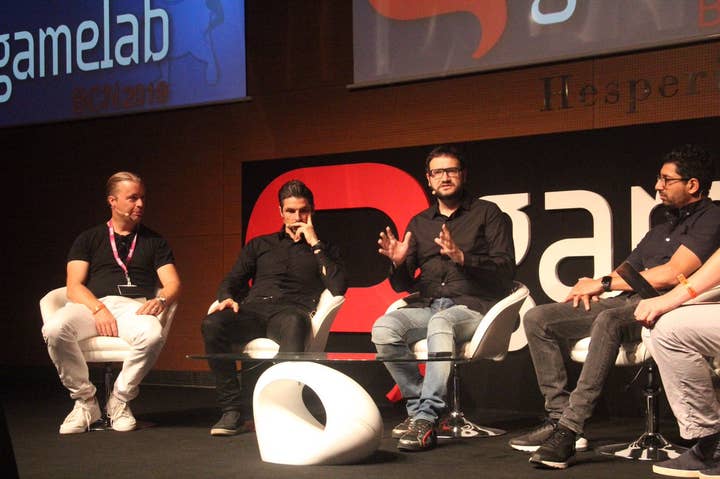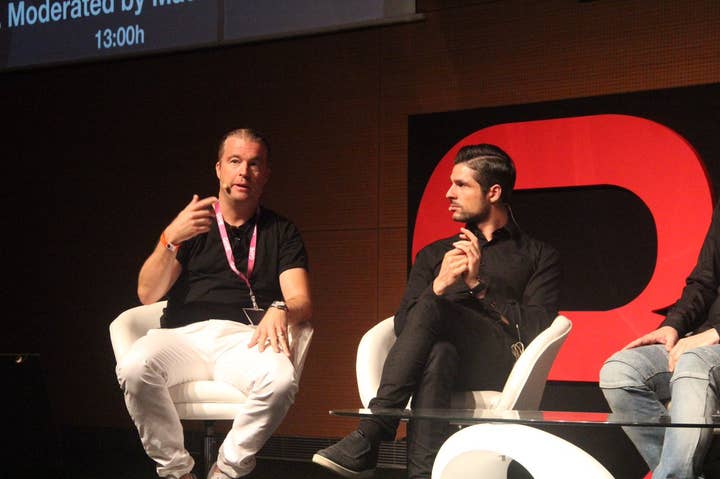Paradox Interactive: "The 70/30 revenue split is outrageous"
At Gamelab 2019, a developer panel discussed Epic's attempt to offer an alternative to the dominant revenue share model
The 70/30 revenue split offered to developers by most platform holders is "outrageous," according to Paradox Interactive's Fredrik Wester, who praised Epic Games' efforts to offer a more reasonable alternative with its own store.
Speaking as part of a panel at Gamelab last week, which was hosted by GamesIndustry.biz, Wester did not mince his words when talking about the deal that the industry's biggest distribution platforms offer to developers.
"I think the 70/30 revenue split is outrageous," he said. "I think the platform holders are taking too much money. Everyone in the press here, just quote me on that."
Wester is now executive chairman of the board at Paradox, after stepping down as CEO after a long tenure last year. In that time, the Swedish company built its business on PC genres like grand strategy and simulation, with Valve's Steam as perhaps its most important marketplace.
Steam takes 30% of revenue from the majority of games on its platform -- just like platforms operated by Microsoft, Sony, Apple and others. However, Wester suggested that the 70/30 split was based on a model established by Warner Bros. in the '70s, for the distribution of films on boxed VHS tapes.
"The platform holders are taking too much money. Everyone in the press here, just quote me on that"
Fredrik Wester
"That was physical. It cost a lot of money," he said. "This doesn't cost anything. So Epic has done a great job for the whole industry, because you get 88%. Fantastic move. Thank you very much."
While Wester was unequivocal in his assessment of the issue, Epic has received criticism from consumers for using exclusives as a means of building an audience; making it necessary for gamers to have a second PC storefront and launcher to access specific products.
Last week, Epic CEO Tim Sweeney entered a discussion on the issue on Twitter, citing the need for a challenge to the "70/30 status quo" enforced by stores like Steam, for the good of developers who could reinvest the money.
Epic achieving that objective of providing a competitive alternative to Steam is important for the industry, Wester said.
"I think it is, especially for new developers. They have lower margins, to get into the market. But I think it's also a matter of decency. I mean, how much does it actually cost to deliver a game?
"When the competition is low, the platform holder can get a big share of the pie; as competition increases, they need to lower their part of the pie, as well. That's how the market works, right?"

For his part, Sweeney has publicly stated that it will abandon its exclusives strategy if Valve changes Steam's revenue share to offer developers a more favourable deal. Right now, though, any developer faces a potential backlash if they opt to accept an exclusivity deal with the Epic Games Store.
This is a particularly tricky situation for smaller developers, which have small fan-bases that are likely to be Steam users. In addition, the kind of incentives -- both financial and in terms of exposure -- that Epic is offering could make the difference between finishing a game and running out of money, or between turning a profit and making a loss. The stakes are high.
"In some cases, that 30% taken is more than the profit for a small studio"
Dan da Rocha
"That [the 88/12 split] is a huge boon," said Dan da Rocha, another panellist, who is best known as the creator of the indie hit Qube. "It's a huge advantage. In some cases, that 30% taken is more than the profit for a small studio. That's just crazy, right? So that's a huge incentive for some of us.
"It's a tricky one. If you have a fanbase on Steam and you go to Epic, there could be a massive outcry there -- a fallout. But it depends on: Is the price right? Does it make sense financially? Is that just a vocal minority on Steam, talking about that and making those arguments?
"It's about weighing that up, I think. But the audience on Epic is getting larger now."
Tequila Works co-founder Raul Rubio offered another perspective, which captured a key change in the value that Steam offers to its partners now, compared to six or seven years ago -- despite its cut remaining exactly the same.
When Tequila Works launched Deadlight in 2012, Rubio said, "the amount of games that were released that year, in 2012, is the same number that are released in one month now on Steam.
"For us it was great, because we got the spotlight; people could see the game on Steam. Now, you basically need to rely on memes to grab attention."
You can look forward to more coverage from Gamelab 2019 this week. In the meantime, you can read God of War director Cory Barlog's thoughts on how improved technology is creating new possibilities for using famous actors in video games, and EA senior designer Katie Scott on improving diversity in FIFA, and how that changed the way EA looks at all of its games.
GamesIndustry.biz is a media partner of Gamelab 2019. We attended the event with assistance from the organiser.

